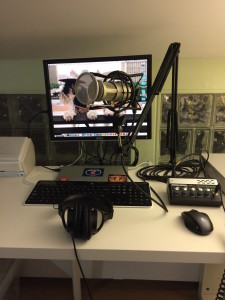 What do you think of the following pitch?
What do you think of the following pitch?
Dear Ms. Covart,
I think my new book George Washington's Winter Wardrobe would make a good discussion piece for Ben Franklin's World. [Amazon Link]
Sincerely,
John Doe
Are you underwhelmed?
I am.
Yet believe it or not, the above pitch represents the format of most of the pitches I receive for Ben Franklin's World: Greeting, book title, amazon link, sign-off.
Podcasts offer historians powerful tools to promote their books and ideas. In this post, you will discover how to pitch a podcaster in a way that will garner you serious consideration for a guest spot.
Behind-the-Scenes of a Podcast
When you download a podcast you receive a 30-60 minute audio file. What you may not know is that 30-60 minute episode represents many hours of a podcaster's time.
For example, each episode of Ben Franklin's World takes 15-20 hours to produce. That work includes reading your book, developing an outline for our discussion, conducting and recording your interview, editing your interview, drafting show notes, recording an intro and outro, mastering the episode so it has a radio-like sound, listening to the final recording to ensure quality, tagging the audio file, uploading the audio file to a hosting service, editing and posting show notes, creating a custom episode graphic for social media, and marketing your episode to listeners and social media followers.
Admittedly, I am spend more time working on episodes than many podcasters because I am committed to ensuring that each of my guest historians sounds as good as possible. However, most podcasters spend at least 6-10 hours on each episode they produce. The majority of us put a ton of work into our shows and you know what?
Very few of us get paid to do this work. We podcast because we have a passion for the media and our topic.
When we receive pitches like the one above we feel insulted. The above pitch demonstrates that the sender did not take the time to get to know us, our show, or our audience. It also reflects that the sender does not value our time. We are too busy to research you and your book, which is why most of us either do not reply or send an automatic "no" when we receive such an e-mail.
How to Pitch a Podcaster: Secrets Revealed
Many podcasters want to be pitched and we want to say "yes."
How do you get us to say "yes?"
Woo us.
That's right, we want to be courted. We want you to tell us who you are, why you love our show, and about the value you can provide to our listeners.
A Good, Fictitious Pitch
Dear Dr. Covart,
I have been following your work for some time and I must say, I enjoy your tweets about early American history. I am sorry that your beloved Red Sox finished in the basement of the AL East this year, but at least there is next year, right?
I write to you because I think my new book George Washington's Winter Wardrobe [amazon link embedded in title text or included at bottom of e-mail] would make an excellent conversation topic for a Ben Franklin's World episode. Mine is the first book to describe and analyze Washington's extensive array of winter capes, jackets, gloves, and boots. I heard you speak with Kimberly Alexander in episode 024. You discussed the deliberate thought early American people gave when they had their shoes and clothes custom tailored to fit the styles of the times they lived in. Did you know that Washington did the same before each winter encampment? The cloak he sported during the frigid winter of 1779/80 at Jockey Hollow was 2 lbs heavier than the one he wore at Valley Forge during the winter of 1777/78. He had an extra-heavy lining installed after his experience at Valley Forge. Also, by wearing his blue wool cape with red lining around the encampment, Washington caused a surge in demand for similar cloaks, which stimulated the national economy. I think your listeners would enjoy hearing this story of how the fashion trends established by Washington's winter wardrobe put Americans to work. We could also talk about how seamstresses and tailors fashioned Washington's wardrobe too as I know your audience loves to hear about the details of everyday life in early America.
If you think your audience would be interested in my work, please let me know and I will have my publisher send you a copy of my book for your further consideration. You should also know that I have over 10 years experience working with clothing and other material sources and that I often speak to public audiences about how historians use clothing to learn about and interpret the past.
Thank you for your time and consideration,
John Doe
Podcaster Pitch Anatomy
Introduction: Demonstrate that you took the time to research the podcast host.
In the above letter, the writer demonstrates that they know I hold a Ph.D., that I like to tweet about early American History, and that I am a huge Red Sox fan. This doesn't mean that they have followed my work for some time, but it does mean that they took the time to visit my website and read my about page and Twitter bio.
Pitch Paragraph: Get to the point.
The author of this fictitious pitch tells me that they have a new book that they wish to discuss on my podcast. They also explain why their book is significant and why my audience might be interested in hearing about the author's ideas. Furthermore, the prospective guest demonstrates that they have listened to Ben Franklin's World. They know about my past guests and show topics and they used that information to explain why their topic is a good fit for my show.
Bio Paragraph: Who are you?
In addition to offering me a review copy of their book, the author tells me personal details that demonstrate why they would make a good guest: They have over 10 years experience working with material sources and they have experience speaking to non-historians about how-to use clothing as a primary source.
Closing: Thank and sign off.
Thank the podcaster for their time and sign your name.
Conclusion
Although not perfectly worded, the above pitch would garner attention from most podcasters because it tells us what we need to know: Who you are, why your book is significant, and why you would make a good guest.
The above letter also demonstrates respect. It shows that the sender took the time to get to know the host, their show, and their audience.
Additional Resources
Do you have questions about how to pitch a podcast host? Leave a comment below, tweet me, or listen to my friend Natalie Eckdahl's episode on "How to Pitch a Podcaster."
